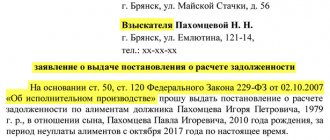How is child support determined in court?
Financial support for a minor child is not a right, but a responsibility of parents. Protection of the interests of children, including property, is entrusted to the mother and father. Therefore, if one of them evades child support, the second is obliged to take all possible methods to recover funds.
The law provides for the following recovery options:
- Voluntary. Based on a notarial agreement.
- Judicial. Based on a court decision.
Going to court is used if the parties are unable to reach an agreement. However, the right of the second parent to go to court in the interests of a minor child is not limited. The court will satisfy the requirements even if a voluntary settlement attempt was not made.
Important! The proper performance of duties by a parent who lives separately from the children is not a reason for refusing a court decision.
Example. Citizen Yu. appealed to the court to recover financial support for the children. However, the father filed an objection to the claim. As arguments, the man indicated the proper performance of duties. The defendant provided evidence (checks and receipts), according to which he regularly transferred funds for the maintenance of children, paid for kindergarten and bought things. However, the court satisfied the plaintiff’s demands, ruling that the court decision would not interfere with continuing to fulfill parental responsibilities.
The following persons have the right to go to court to protect the property interests of a child:
- parent who lives with the child;
- guardian/trustee;
- head of an orphanage;
- adoptive parent;
- specialist of the district guardianship department;
- prosecutor.
Thus, a grandmother or aunt cannot collect child support from one of the parents unless they are properly appointed as guardians.
Adoptive parents are given the obligation to pay financial support to the child, both in case of separation and in case of cancellation of adoption due to their fault. The court may exempt the adoptive parents from paying financial support if the cancellation of adoption occurs at the initiative of the child.
Court hearing on alimony
After checking the appearance of the parties and questions regarding challenges, the participants in the process are introduced to the rights and responsibilities and are provided with technical information regarding maintaining a voice recorder or filming the child support court on video. After the participants are presented and the claim is announced, the trial begins.
What questions are asked in child support court?
During the hearing, the court must find out all the circumstances relating to the maintenance of children, taking into account the financial capabilities of both parties. What to say in court when collecting alimony is determined by the questions asked, the presence of arguments and counterarguments, and witness testimony. You can prepare in advance and develop behavioral tactics in relation to standard questions asked in court. The plaintiff is advised to take the following position:
- The first question about maintaining the claim requires an unequivocal affirmative answer, since otherwise further proceedings are considered meaningless.
- The next thing that is asked in child support court is to find out whether attempts were made to reach an amicable agreement, whether a voluntary transfer of funds was made, when and in what amount? The plaintiff must answer honestly regarding the funds received (in case of payment), without showing personal hostility in order to communicate with the defendant once again, resolving the issue of voluntary payment, since the court may regard the fact as an unwillingness to act in the interests of children contrary to one’s own ambitions.
- Finding out the specific amount needed to support children, taking into account additional needs. Even if there is a need for financial resources, you should not make this clear personally, since child support is paid for children, and to obtain personal support, a separate claim must be filed. It is advisable to submit documents confirming the child’s expenses, which increase as they grow older, for education and development.
How long a court hearing on alimony lasts depends on the availability of supporting documents, the time spent interviewing witnesses and the arguments of the parties. Ideally, if the defendant agrees to admit the claim, then the process ends, limited to one issue.
To win a court case regarding alimony for the defendant and pay the minimum, lawyers recommend adhering to the following tactics:
- When asked questions regarding non-payment, answer with reference to financial impossibility that is temporary.
- The decrease in income level should be explained by objective reasons independent of the individual, and not by the desire to evade child support. For example, dismissal from work due to the liquidation of an enterprise and at one’s own request “going nowhere” will be regarded by the courts as diametrically opposed.
- Opening an individual business or registering as self-employed should convince the court not of the ease of concealing income, but of the desire to earn money in the future in order to provide for children in the near future.
Jurisdiction: which court hears cases of alimony collection
Collection of financial support has special jurisdiction:
- in case of an application in the interests of a child, documents can be sent to the place of residence of the minor or to the place of residence of the parent.
- in the case of an application in the interests of adult citizens, documents are sent exclusively to the defendant’s place of residence.
You can submit an application for recovery of financial security to the following judicial authorities:
- Magistrates' Court (in the order of writ or claim proceedings).
- District court (as an additional requirement for the cancellation of adoption, deprivation of parental rights and establishment of paternity).
The procedure and methods for collecting alimony for minor children
You can recover financial support in the following way:
- By order. The most popular recovery option is a writ. This is the easiest way. The applicant prepares a package of documents and an application in 2 copies. After which, the court considers it within 5 days and issues a court order.
A court order is easy to obtain, but challenging is also easy. The defendant can simply petition the court that issued the document to request an annulment. The main condition is compliance with deadlines. You can challenge the order within 10 days.
Important! A prerequisite is the presence of a document about the citizen’s income and place of official employment.
- By way of legal proceedings in the magistrate's court. The method is used to protect the rights of minors in the absence of data on the payer’s earnings and place of work. It can also be applied to the unemployed and entrepreneurs. Filing a claim is possible if the alimony holder challenges the court order. If the applicant wishes to additionally recover funds for the past time, then the application is also submitted in the manner of claim proceedings.
The writ procedure is provided for the collection of funds for minor children. Therefore, when applying for financial support for an adult citizen (disabled relative or pregnant wife), a statement of claim is filed.
- By way of legal proceedings in the district court. Separately, it is necessary to highlight the appeal to the district or city court. This option is provided in the case of filing an application for the resolution of family disputes that are not within the jurisdiction of the magistrate’s court. These include deprivation of parental rights, establishment of paternity and cancellation of adoption. The collection of alimony is provided as an additional requirement.
Filing a claim and preparing for trial
The statement of claim is drawn up in accordance with the requirements of Articles 131-132 of the Code of Civil Procedure of the Russian Federation, where the descriptive part sets out the circumstances affecting the interests of the financial support of children and attaches the relevant supporting documents, or if it is impossible to obtain, witnesses are recommended to testify.
Sample claim to the magistrates' court for alimony
: Sample statement of claim for the collection of alimony for a child (children) (18.3 KiB, 411 hits)
Deadlines and preparatory actions
In the preparation process, the judicial authorities use a formal approach, based on the drawn up claim and the stated argumentation, producing:
- mailings to the parties and named witnesses regarding the date of the court hearing;
- requests for information and attachments of additional documents if necessary;
- determination of actions that need to be taken before the trial process.
The legislation does not define clear deadlines for how long the alimony trial lasts in stages. In total, the process is allocated:
- to the magistrate's court – a month;
- district court – 60 days.
Five days are allotted for the claim to be accepted for processing or rejected if drafted incorrectly, and preparation for the hearing lasts about two weeks.
Actions if it is impossible to appear
The date and time of the court hearing are set by the judicial authority, but failure to appear without prior notice of the impossibility of attendance is regarded by the judicial authority as an unreasonable absence, provoking a negative attitude.
If the defendant fails to appear in court for alimony twice without a good reason, then the court hearing will take place without his presence. Similar behavior by the plaintiff leads to the fact that the claim will not be considered.
It is in the interests of both parties to report a failure to appear in advance, as far as possible, outlining depending on the motivating factors:
- a request to postpone the meeting due to illness, attaching a supporting document or illness of a witness whose testimony is important for making a decision;
- a request to conduct proceedings without presence, beneficial for the defendant’s failure to appear in court for alimony in the absence of counterarguments and unwillingness to explain the reasons for the failure to provide assistance to children;
- explanation in a telephone conversation with the office of the judicial authority in the event of force majeure circumstances that caused a delay or impossibility of arrival.
Ignoring an invitation to court reduces the right to protect one’s own interests by justice authorities, regardless of the citizen’s status. If a sufficient evidence base has not been collected, which requires preparation in time, then there is nothing more beneficial for each of the parties than to postpone the court hearing on alimony.
Documents to court
The list of documentation depends on the specific situation and type of application.
To apply for a court order you must attach:
- the applicant's civil passport;
- birth document of a minor;
- information about the income of the alimony provider;
- certificate of family composition;
- child's passport (if available).
If the application is not submitted by a parent, then additional documentation confirming the authority is attached:
- certificate of a guardian or trustee;
- foster parent's certificate;
- guardianship order;
- an agreement on the transfer of a minor to a foster family;
- order for placement under supervision in an orphanage;
- power of attorney from the district guardianship department.
If the application is submitted in the manner of legal proceedings, then additionally attached:
- petition to request missing information;
- evidence of the need for funds;
- calculation of costs for a child;
- information about the customer's income.
When sending an application to a district or city court, it is necessary to substantiate the main claims. This will require additional evidence.
Time limits for collecting child support
The period directly depends on the type of application and the method of application.
Possible options
| No. | Option | Term |
| 1 | Application for a court order | 5 days |
| 2 | Statement of claim to the magistrate's court | 30 days |
| 3 | Statement of claim to the district/city court | from 2 months |
You can go to court at any time. The statute of limitations does not apply to the collection of alimony payments. The main condition is the presence of grounds.
Expert opinion
Stanislav Evseev
Lawyer. Experience 12 years. Specialization: civil, family, inheritance law.
Therefore, the mother can recover funds from the father for the child until he comes of age. And for a disabled relative, the payment may be withheld during the period of incapacity and need. In addition, the financial capabilities of the payer are taken into account.
The law establishes the possibility of withholding funds from the moment the application is submitted, but also for the past time. The maximum period is 3 years. However, the applicant must prove that he took measures to collect financial security, and the alimony provider avoided resolving the issue.
How does collection proceed?
It is unlikely that the alimony payer will grab the writ of execution with a happy smile and rush to the accounting department of his employer. With conscientious payers, it usually doesn’t end up in court; everything is resolved voluntarily.
This means that enforcement proceedings will be forced. The decision or order to calculate alimony will be sent to the bailiffs of the city/county where the debtor lives.
If you wish, you can speed up this process and agree in court that you will deliver the documents yourself. There is no such possibility - the bailiffs will receive documents from the court by mail.
The bailiffs open their own case, this time about enforcement proceedings. They contact the debtor, his employer and bring the matter of collecting alimony to the start of actual payments. But this is ideal.
Bailiffs may find that the debtor:
- hiding;
- does not officially work anywhere;
- plans to challenge the court's decision.
Then the bailiffs act according to the law and the circumstances: they search for the debtor’s property, put him on the wanted list, and so on.
According to some data, approximately 70% of fathers who are required to pay child support avoid it in every possible way.
The following video instructions will help you figure out how to receive alimony and how it is collected by a court decision:
Procedure for paying alimony
The Family Code establishes the following options for paying for material support:
- Percentage ratio to the payer’s income (applies only when collecting funds for minor children). Art. The RF IC provides for withholding a share of income depending on the number of children. For example, for 1 child you need to deduct ¼ share of income. For 2 children 33% is paid. If the payer has 3 or more minor children, then ½ share is withheld.
- Flat amount (used primarily for adult recipients). For children it is used as a last resort. For example, if the payer has no regular income. Or if you have additional unstable income (rotation work, entrepreneurship). The calculation of the amount is based on the applicant's income and expenses. In addition, the court takes into account the needs of the payer. He must be able to provide for his own needs after making payments.
- Settlement of property. At the initiative of the payer, it is possible to transfer valuable property into the child’s ownership to offset payments. The advantage of this option is that there is no need for monthly payments. However, this option is only possible with the consent of the buyer.








